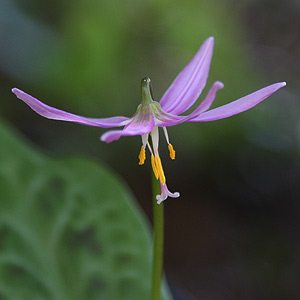
Erythronium revolutum – Trout Lily or Pink Fawn Lily
A lovely flowering woodland plant, Erythronium revolutum are originally from the forests of California through to areas further north . They are sometimes referred to as ‘Fawn Lily’ or ‘Trout Lilies’. These are a spring flowering plant and they prefer a cool part shaded position in a humus rich moist but well drained soil.
The pagoda like flowers of these bulbs are very attractive, however the green foliage often with brown or ‘fawn’ mottled markings is a bonus. This species is perhaps the latest of all of the erythroniums to appear in spring.
The flowers rise above the foliage and hang down with a ‘pagoda shape’, usually pink.
Darker forms (Erythronium revolutum ‘Johnsonii’) are available along with a few named cultivars including ‘rose beauty’ and ‘white beauty’.
The reflexed petals which will curve up as the flower matures over a few days, and mottled green foliage are an attractive addition to the garden.
These wonderful woodlanders can also be grown in pots and containers in groups of 10 – 15 for a great display.
Erythronium revolutum Care and cultivation
One of the easier species to grow Erythronium revolutum flowers regularly for us. If planting in the garden dig in some well rotted compost and cow manure 3-4 weeks before planting, protection from hot afternoon sun is essential, and a well drained soil is also required. We use a liquid seaweed fertilizer every two weeks during the growing season
- Best in a humus rich moist soil.
- Part shade with morning sun.
- Do not allow the soil to ‘bake’ in summer, keep slightly moist
- Fertilise in early spring as growth commences
- Best planted in a small clump in the border or in a container
You may also be interested in :
Erythronium revolutum are available for sale from the following nurseries
'Sylvan Vale' 375 Olinda Creek Rd, Kalorama, VIC.3766
Including a large range of Rare and unusual bulbs, corms and perennials
www.tonkinsbulbs.com.au
PO Box 7040 Leura NSW 2780
Rare woodland plants, Trilliums Epimediums, Arisaemas, plus much more.www.lynnsrareplants.com.au


